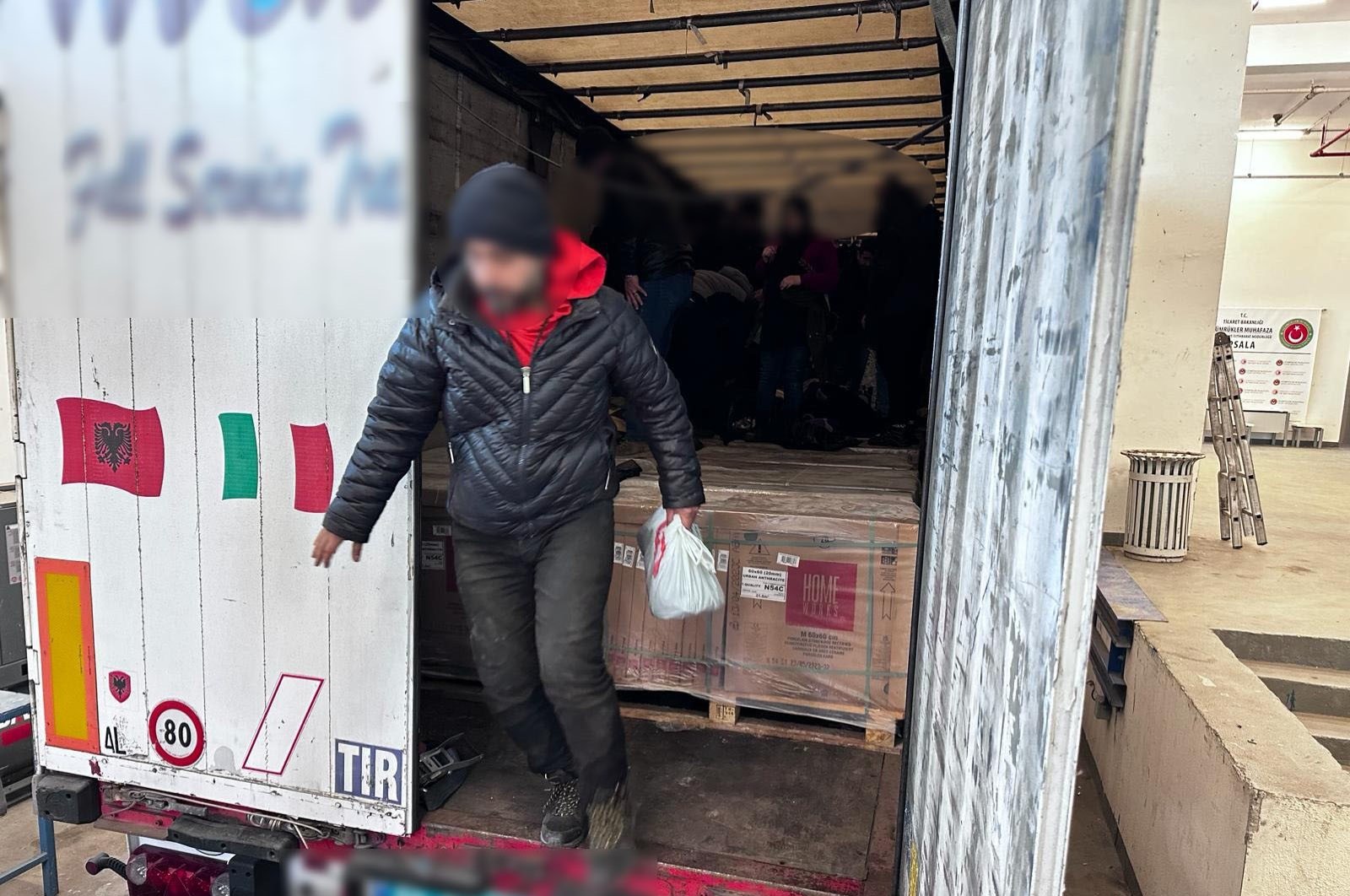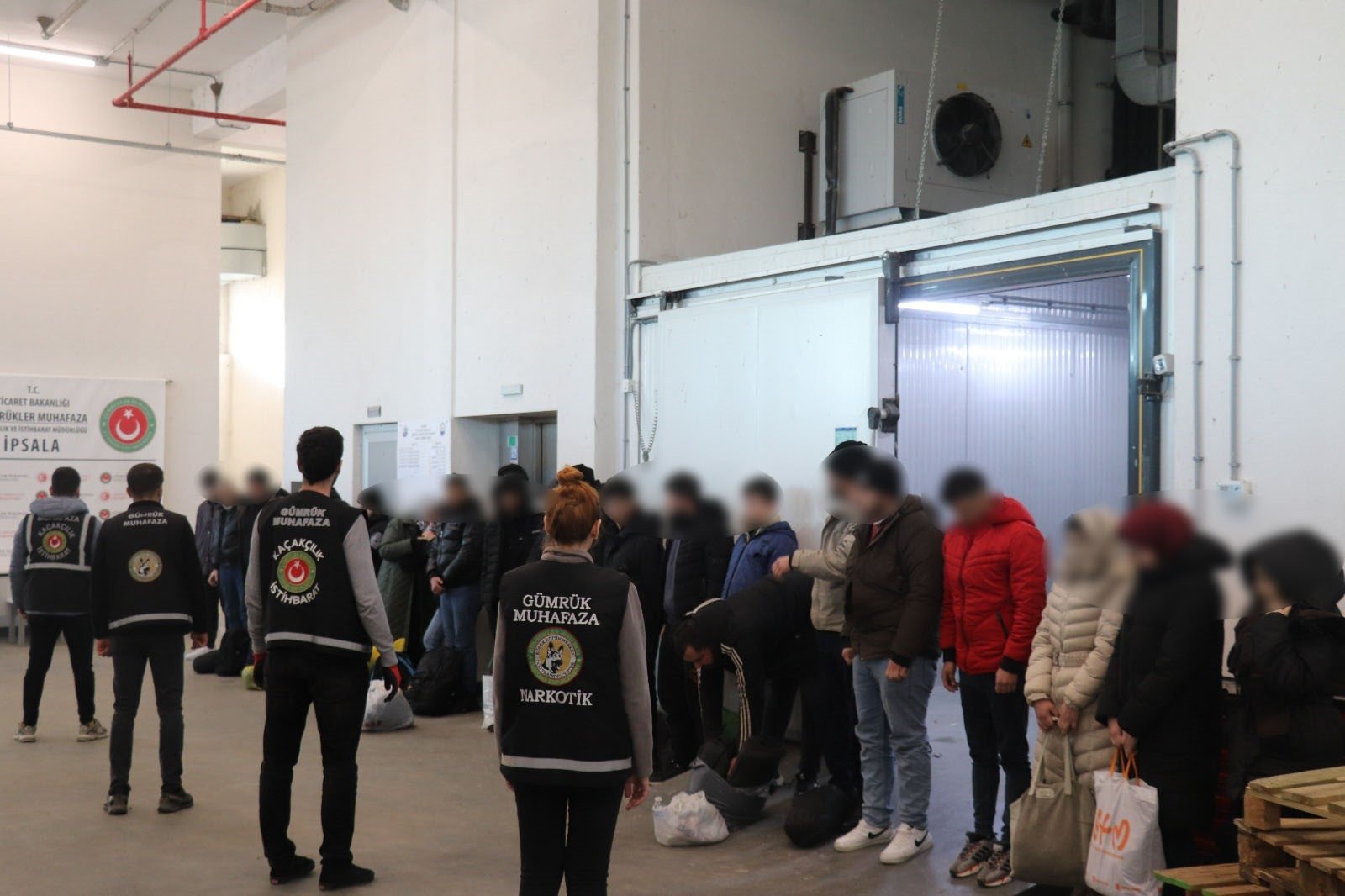
Despite a drop in migrant activity on its northwestern land borders, Türkiye still sees droves of irregular migrants smuggled in through its eastern borders where it’s tightening measures
As part of its intensifying response to ongoing challenges of irregular migration, Turkish security forces on Wednesday detained over hundreds of irregular migrants and busted a migrant smuggling ring in nationwide raids.
In an operation dubbed "Shield-13,” Turkish police and border guards captured some 333 irregular migrants, as well as some 42 smugglers trying to bring in droves of irregular migrants through Türkiye’s Iranian border, Interior Minister Ali Yerlikaya said via X.
The smugglers, 31 of whom were part of an organized crime ring whose account activity was found to be over TL 10 million, were captured in raids in Van, Şanlıurfa and Gaziantep provinces in the east, and Izmir and Düzce provinces in the west, according to Yerlikaya.
Authorities arrested 17 of the detainees, including foreign nationals, while others are still in for questioning, the minister informed. Six smugglers were caught in Şanlıurfa, with four arrested and two released under judiciary control, while two more were arrested in Adana and another in Batman. Police also seized unlicensed rifles, dozens of mobile phones, SIM cards and a large amount of foreign currency.
The irregular migrants were taken to the provincial migration authorities who will oversee their deportation to their home countries.

Migrant crisis
Türkiye has been a key transit point for irregular migrants who want to cross into Europe to start new lives, especially since the beginning of the Syrian civil war in 2011. Every year, hundreds of thousands of migrants flee civil conflict or economic hardship in their home countries with the hope of reaching Europe.
Some migrants are able to make the dangerous journey over land or sea with the assistance of smugglers, who often abandon them, especially during sea journeys, after receiving thousands of dollars from each migrant. Others are stopped by Turkish security forces before crossing the border into Europe.
In some cases, neighboring Greece is accused of pushing back migrants in a controversial practice. In the Aegean Sea, Greek coast guard boats often drive out approaching migrant boats to the Greek islands.
In the northwestern province of Edirne, several cases of similar "pushbacks” were documented in the past years. In some cases, migrants were found naked and bruised after what they claimed were from beatings at the hands of Greek border officials who stripped them and forced migrants to march back to the Turkish side.
The latest statistics, between 2010 and 2023, show Türkiye rescued 184,175 irregular migrants from its seas after they put their lives in danger with the hope of reaching Europe. Some 923 migrants, on the other hand, ended up dead on perilous journeys in the same period, while 503 people remain unaccounted for after their boats sank.
Last year alone, 20 people died while traveling to nearby Greek islands from the Turkish coast. Eleven went missing as they strived to reach the islands in the Aegean Sea, while the Turkish Coast Guard Command saved 23,977 irregular migrants from certain death.
In 2023, authorities intercepted 254,000 irregular migrants and arrested 3,744 migrant smuggling organizers.
Mobile checkpoints
Türkiye, which already hosts 4 million refugees, more than any other country in the world, is taking new measures at its borders to prevent a fresh influx of migrants, balancing a humanitarian policy and the need to stop thousands from risking their lives.
As most irregular migrants try to infiltrate Türkiye through its eastern borders, the country recently began constructing a security wall. Authorities say 80% of the wall and a 1,234-kilometer (767-mile) patrolling strip next to the wall are completed, with the remaining section set to be completed within the year.
The Directorate of Migration set up "mobile migration points” to speed up the processing of irregular migrants. The migration points, the first of its kind in the world, help law enforcement in the field to check for irregular migrants.
They use a fingerprint database to check the identity of suspected irregular migrants and cut the red tape for legal migrants who have to prove that they have permits, often by visiting police stations.
Speaking at a ceremony in Istanbul for the delivery of some 65 vehicles for mobile migration points, Yerlikaya pointed out irregular migration as "one of the biggest global crises” and said Türkiye was "exposed to it due to regional instability, wars and chaos.”
The ministry is working to tackle irregular migration in four phases, Yerlikaya said, stressing that the first of which is to resolve the issue at its root "before the migrant leaves their country.”
"Second is effective border security measures conducted by the National Defense Ministry units. Third is effective detection and detention within the borders and fourth is facilitation of fast deportation processes,” Yerlikaya explained.
He said mobile migration points come in handy as a method that allows authorities to carry out inspections on irregular immigrants quickly and smoothly, without disturbing tourists or foreigners with legal permanent residence in Istanbul, Türkiye’s financial and touristic hub of 16 million people.
Since the practice was launched in July 2023 on 30 points in Istanbul and expanded to 103 stations with Tuesday’s ceremony, authorities processed 192,934 foreigners in the city and 56,620 of them were sent to deportation centers.
Across Türkiye, a total of 162 migration point vehicles serve in 30 metropolitan cities, which Yerlikaya assured would increase within 2024. These processed 286,102 foreign nationals and found 61,429 of them to be irregular migrants, the minister informed.
Since June 2023, authorities also captured 798 smugglers and arrested 201 while releasing 103 with judiciary control and intercepting more than 80,000 irregular migrants in Istanbul.
